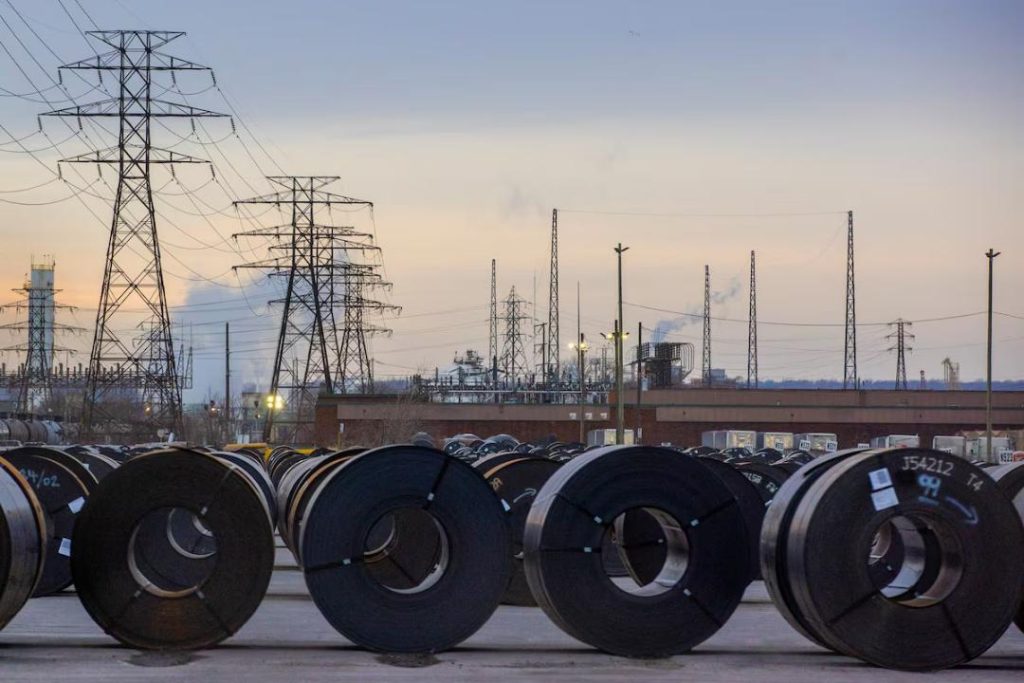
US Tariffs Hit Canada’s Steel & Aluminum Industry, Job Cuts Begin
In a move that has sent shockwaves through the Canadian economy, the US tariffs on steel and aluminum have led to major job losses in the country’s steel and aluminum industry. At least 200 workers have been affected, with many more expected to follow suit as the economic fallout continues to unfold.
According to Marty Warren, National Director of the United Steelworkers, the tariffs have already begun to take their toll on the industry. “The US tariffs have created a perfect storm for our industry,” Warren said in an interview. “We’re seeing plant closures, layoffs, and a general decline in production. It’s a very difficult time for our members and their families.”
One of the companies that has been hit hardest by the tariffs is the Canada Metal Processing Group. The company has cut 140 jobs due to the “threat of incoming tariffs,” according to a spokesperson. The layoffs have had a devastating impact on the workers and their families, with many struggling to make ends meet.
The tariffs were imposed by the US government in March 2018, with the aim of protecting the country’s domestic steel and aluminum industries. However, the move has had far-reaching consequences for Canada’s steel and aluminum industry, which is heavily reliant on exports to the US market.
Economists warn that the tariffs are not just a short-term problem for the industry, but rather a long-term threat to the very survival of the sector. “The tariffs are a significant obstacle to the growth and development of the steel and aluminum industry,” said Andrew Grantham, an economist at CIBC World Markets. “If left in place, they could lead to a decline in production, investment, and employment in the sector.”
The situation is set to worsen in the coming weeks, with additional tariffs set to come into effect on April 2. The Canadian government has urged the US to reconsider its decision, but so far, there has been no indication that the tariffs will be lifted.
The impact of the tariffs is not limited to the steel and aluminum industry. The broader Canadian economy is also feeling the effects, with many businesses and workers dependent on the sector. “The tariffs are having a ripple effect throughout the economy,” said Warren. “It’s not just the steel and aluminum industry that’s being affected, but also suppliers, manufacturers, and other businesses that rely on the sector.”
The job cuts and plant closures are not just a short-term problem for the workers and their families, but also have long-term consequences for the communities in which they live. “The steel and aluminum industry is a vital part of many communities,” said Warren. “When plants close, it not only affects the workers, but also the local businesses, schools, and services that rely on the industry.”
In addition to the job losses, the tariffs are also having a negative impact on the Canadian economy as a whole. The country’s GDP has been affected, with many economists warning of a decline in growth if the tariffs are not lifted.
The Canadian government has announced plans to impose retaliatory tariffs on US goods, but many economists believe that this will only lead to a cycle of tariffs and retaliation, rather than a resolution to the issue.
The situation is a stark reminder of the importance of free trade agreements and the need for countries to work together to resolve disputes. “The tariffs are a reminder that trade is a two-way street,” said Warren. “We need to work together with the US to find a solution that benefits both countries, rather than imposing tariffs that harm our own industry and workers.”
As the situation continues to unfold, one thing is clear: the US tariffs on steel and aluminum have had a devastating impact on Canada’s steel and aluminum industry, with major job losses and plant closures already underway. The situation is set to worsen in the coming weeks, with additional tariffs set to come into effect on April 2. It is imperative that the Canadian government and the US government work together to find a solution that benefits both countries and resolves the issue of the tariffs once and for all.
Source:






